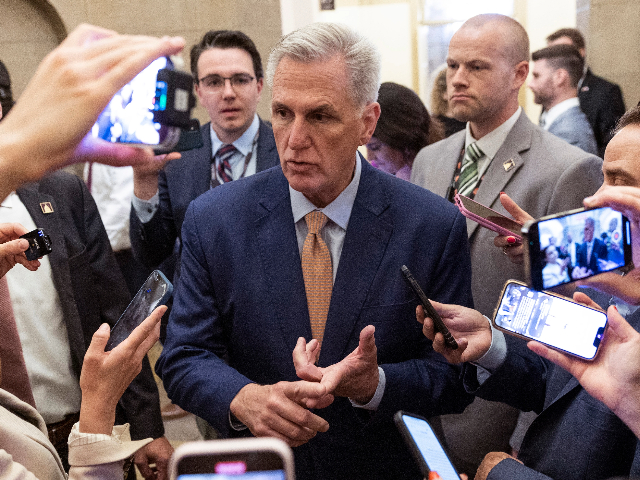
House GOP efforts to advance government funding vehicles that would exert the leverage of the party that controls just one half of one-third of government have thus far failed, and with a Sept. 30 deadline just days away, several top conservatives are concerned that the Republicans might have blown it.
Overall, the House Republicans generally state their goal is to, for the first time in decades—since 1995 to be exact–pass the 12 separate appropriations bills funding the entire government through the 12 different vehicles rather than through one big one like an omnibus or another catch-all funding bill for the full government, or most of it. Conservatives have long fought for this, and Speaker Kevin McCarthy agreed to it during the Speakership election earlier in the year, as they believe splitting the funding of the government back up into the 12 separate bills will give conservatives more leverage as they fight to use the funding brinksmanship as a leverage point with Democrats to achieve policy changes.
Before August recess, the House Republicans had only passed one of the 12 bills—the Military Construction-Veterans Affairs, or MILCON, appropriations bill—out of the House. It passed in late July 219-211. The Agriculture appropriations bill was supposed to be second, but disagreements between different factions of the GOP conference on spending levels there forced GOP leadership to call that one off for now, and then Congress broke for August recess with plans to begin taking these fights up in earnest upon its return.
When the House came back from the August recess in early September, House Speaker Kevin McCarthy at first tried to advance what is called a continuing resolution—or CR in DC parlance—that would have funded the government until early December. That move would have bought House Republicans more time to pass the remaining 11 appropriations bills this fall over September, October, and November—if the Senate agreed to it and the president signed it, by the way—but those plans were quickly scuttled as a group of hardline House conservatives, many of whom were against McCarthy during the speakership fight, threatened to tank that CR plan.

WASHINGTON, DC – MAY 23: U.S. Speaker of the House Kevin McCarthy (R-CA) speaks to reporters as he returns from a House Republican caucus meeting, at the U.S. Caption on May 23, 2023 in Washington, DC. U.S. President Joe Biden and McCarthy met yesterday to discuss raising the debt limit in an effort to avoid a default by the federal government. (Photo by Kevin Dietsch/Getty Images)
So, McCarthy went back to the drawing board and empowered House Freedom Caucus chairman Rep. Scott Perry (R-PA) to negotiate a different CR with his moderate counterparts from the other side of the conference called the Main Street Partnership. They succeeded, and developed a plan they supported—one that would have funded the government until the end of October instead of early December and would have contained many of the hardcore immigration provisions in the House GOP messaging bill HR2. The thinking among the conservatives who backed this, like Perry, was that if the House is going to have a shutdown and funding fight with the Senate and White House, it might as well be about the GOP’s strongest issue, which is immigration. Obviously, American cities are being torn apart by migrants right now to the point where even the governor of Massachusetts has declared an emergency and the governor of New York says no more space is available in Empire State hotels for them.
What the Republicans were intending to do at this point was simple: pass this CR that the chairman of the Freedom Caucus negotiated, jam the Senate, and if there was a shutdown make clear it was the Senate’s fault. Then, in the meantime, they would move back to passing the other 11 appropriations bills starting with Pentagon funding. Those best laid plans, however, collapsed again when several hardliners led by Rep. Matt Gaetz (R-FL) said they would not back any CR at all under any circumstances—and a group of them tanked the Pentagon appropriations bill twice—thereby blowing up this deal too.

U.S. Rep.-elect Matt Gaetz (R-FL) delivers remarks in the House Chamber during the third day of elections for Speaker of the House at the U.S. Capitol Building on January 05, 2023 in Washington, DC. The House of Representatives is meeting to vote for the next Speaker after House Republican Leader Kevin McCarthy (R-CA) failed to earn more than 218 votes on several ballots; the first time in 100 years that the Speaker was not elected on the first ballot. (Anna Moneymaker/Getty Images)
Where things stand now is that the House Republicans—reportedly at Gaetz’s urging during a meeting with McCarthy this week—have ditched the immigration-strong Perry-negotiated CR for going back to just passing the original 12 appropriations bills. That seems next to impossible to achieve by the end of next week, which means a government shutdown is likely.
The Pentagon funding bill will very likely be back on track early next week, as one of the biggest hiccups in that was that it contained $300 million in funding for Ukraine. That led to Rep. Marjorie Taylor Greene (R-GA), normally a reliable McCarthy ally, voting against the rule on this bill preventing the House from considering and passing it. Greene released a video on Friday in which she angrily explained how she would vote for the Pentagon appropriations plan without that Ukraine money in it, and McCarthy has reportedly agreed to remove it ahead of another push next week to get it done.
Here’s why I’m not in Washington right now. https://t.co/SEgPSC1ZG0
— Rep. Marjorie Taylor Greene🇺🇸 (@RepMTG) September 22, 2023
While this is all going on, several House Republicans from the more moderate side of the conference—led by Rep. Michael Lawler (R-NY), who represents a district Democrat President Joe Biden won—are threatening to sign a discharge petition on a vehicle that House Democrats have prepared that would fund the government entirely through a CR at current levels until mid-January 2024. Lawler has at least one other Republican willing to sign the Democrats’ discharge petition, according to NBC News, and during an interview on Friday morning with Hugh Hewitt he named two others he thinks would join the push if it came to that. Assuming all House Democrats sign such a discharge petition, which can force a vote in the House via a privileged resolution circumventing the House Speaker with 218 signatures, at least four other Republicans would need to join Lawler to do it. The House Problem Solvers Caucus, a bipartisan group boasting dozens of Republicans as members, has been at the forefront of this idea. The closer the country comes to that Sept. 30 deadline without a solution from the House Republicans that can make it past the Democrat-controlled Senate and get signed into law by the Democrat president, the more likely this outcome becomes.
Meanwhile, Gaetz has for weeks been throwing around the possibility of using a privileged resolution of his own to try to remove McCarthy from his position—what is called a motion to vacate the chair—in the middle of all of this. For that to succeed, Gaetz would need close to if not all of the Democrats in the House to vote with him to remove McCarthy—no sure guarantee either way—and then he would need to similarly make up the difference with Republicans to get to 218 votes. House Democrat Whip Katherine Clark, a Massachusetts Democrat, told Politico Playbook on Friday morning that she and other Democrats would be willing to save McCarthy or help Gaetz but, the House Democrats’ price is steep: Among other things, they want an end formally to the just-launched impeachment inquiry into Biden over corruption with regard to his family members’ business dealings.
Rank-and-file House Republicans are growing tired of the antics og people like Gaetz, too, and several are speaking up expressing their discomfort with these actions.
“I think there’s some people who like being in the permanent minority, no doubt about that,” Rep. French Hill (R-AR) told CNBC, for instance. “When I joined Congress when John Boehner was Speaker, the rule was bring bills to the House floor that have a majority of the majority. And well, we’ve tried to do that. Now we have the Tyranny of the Tiny. A handful of people that are blocking the majority of the majority from bringing up conservative policies that are more conservative in design and price.”
Rep. Kelly Armstrong (R-ND), one of the negotiators for the moderates, told NewsNation he finds the whole thing disconcerting.
“I negotiated with some of my colleagues — and they negotiated in good faith,” Armstrong said. “But if we can’t control the votes within the micro-universes within the conference, I don’t know how you can blame the Speaker for not being able to control those votes.”
Rep. Ryan Zinke (R-MT), who served as former President Donald Trump’s Secretary of the Interior, said the deals the conservatives are getting are better than they won in earlier negotiations.
“Here’s here’s the irony of it. The deal was struck McCarthy the appropriation bills, which we all said we’d do – we we’d go to the 12 appropriation bills, we’d have open amendments, we’d work on them, we’d curb the spending – those appropriation bills are actually lower than what was agreed upon,” Zinke said, according to CNN. “In some cases significantly lower so you’re right when the goal line changes, and you have a few people that won’t vote for anything.”
Rep. Mike Turner (R-OH), the chairman of the House Permanent Select Committee on Intelligence (HPSCI), went even further, saying these members are behaving like Democrats.
“It’s mischaracterizing these individuals as conservatives. Conservatives are overwhelmingly voting with Kevin McCarthy… they’re saying Kevin cannot get support from Democrats — they’re voting with the Democrats,” Turner said on Fox News.
Even Mark Levin, the nationally syndicated radio host, accused Gaetz and his allies of having a “temper tantrum and nothing more” and of not taking a “principled stand with a strategy and endgame.”
I’m at Union Station in DC waiting for the train. I’m forced to watch CNN. With a government shutdown looming, which actually means the vast majority of the government remains open, the media drumbeat as if these are the end times is sickening. When governors shutdown the private…
— Mark R. Levin (@marklevinshow) September 22, 2023
But perhaps the person who put it best was Cliff Sims—the one-time Trump White House official turned deputy Director of National Intelligence under Trump—who told Breitbart News that this mess that House Republicans are in thanks to Gaetz and company undercuts GOP leverage in fights with Democrats.
“Conservatives who really understand what’s going on here know that Gaetz sabotaged the greatest chance in decades to exert leverage against the Senate and White House on a real border security package,” Sims said. “Some of the most conservative members developed a package to include most of HR2 in the continuing resolution. It would already be on Schumer’s desk right now were it not for Gaetz. Now, he’ll say, ‘Oh, I’m for that; it’s why I want single-issue appropriations bills.’ That’s messaging for low-information voters that he’s trying to manipulate. In reality, his conservative colleagues know his antics stopped the real momentum, which is why some of them are calling him out. Conservatives love a fighter, but what we really love is a fighter who’s smart, strategic — and knows how to win, which is why Trump’s approach has always resonated so much.”
So, with all that said, what’s happened here, all because a handful of House hardliners presenting themselves as conservatives are refusing to take wins, is the GOP’s strongest border and immigration plan in recent memory has blown up with the CR going down, the Republicans may lose all their leverage in spending negotiations altogether if the discharge petition route happens, and if things really go awry with motion-to-vacate efforts it could blow up the nascent impeachment inquiry into Biden. That’s not to mention the Democrat and establishment media machine is already salivating at the likelihood they will spend the next several weeks bashing Republicans as incompetent if a shutdown comes.





